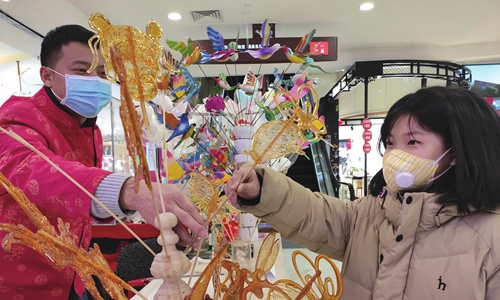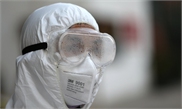
A girl buys a rat-themed sugar painting from a vendor, both wearing masks at a mall in Beijing on Wednesday. More people are wearing masks to protect themselves from the mysterious coronavirus which causes a pneumonia-like disease. There have been 10 confirmed cases in the capital city as of Wednesday evening. Photo: cnsphoto
A total of 194 salespersons at a department store of Tianjin's Baodi district were quarantined with 9,200 people who went to the store from January 19 to 25, officials of North China's Tianjin Municipality said at a press conference on the latest situation on the novel coronavirus.Tianjin had 81 confirmed cases on Friday, of which 23 patients live in Baodi district. Two newly added patients on Friday both live in the district.
Mao Jinsong, Baodi district head, said the 23 patients were all part of the Baodi department store. Tianjin published the traces of confirmed cases promptly and investigated people who made contact with the confirmed patients at the department store. There may be more than 9,200 who had contact with the confirmed patients in the department store, Mao said.
The investigations shed light on the extent of the novel coronavirus' transmissibility.
The first confirmed patient in the district surnamed Zhang is a salesperson in the store and another three patients were Zhang's husband and two colleagues. The fifth patient went to the work area of Zhang's colleagues.
Another two confirmed patients in Baodi district went shopping in the department store. One was a salesperson and the other the daughter-in-law of Zhang's colleague.
To curtail the spread of the virus, Baodi district closed villages and residential communities to limit entry and has set observation points on outbound main roads to disinfect cars. It also uses loudspeakers to broadcast prevention knowledge in villages, chinanews.com reported.
Tianjin Municipality also announced that they would implement close-off community management citywide to further control people's movements.
Global Times


